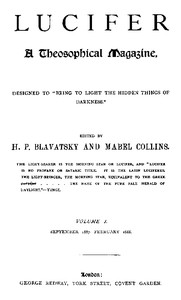Lucifer: A Theosophical Magazine. Volume I. September 1887-February 1888.
Read now or download (free!)
| Choose how to read this book | Url | Size | ||||
|---|---|---|---|---|---|---|
| Read online (web) | https://www.gutenberg.org/ebooks/60852.html.images | 1.8 MB | ||||
| EPUB3 (E-readers incl. Send-to-Kindle) | https://www.gutenberg.org/ebooks/60852.epub3.images | 954 kB | ||||
| EPUB (older E-readers) | https://www.gutenberg.org/ebooks/60852.epub.images | 983 kB | ||||
| EPUB (no images, older E-readers) | https://www.gutenberg.org/ebooks/60852.epub.noimages | 817 kB | ||||
| Kindle | https://www.gutenberg.org/ebooks/60852.kf8.images | 1.4 MB | ||||
| older Kindles | https://www.gutenberg.org/ebooks/60852.kindle.images | 1.2 MB | ||||
| Plain Text UTF-8 | https://www.gutenberg.org/ebooks/60852.txt.utf-8 | 1.6 MB | ||||
| Download HTML (zip) | https://www.gutenberg.org/cache/epub/60852/pg60852-h.zip | 878 kB | ||||
| There may be more files related to this item. | ||||||
About this eBook
| Author | Various |
|---|---|
| Editor | Blavatsky, H. P. (Helena Petrovna), 1831-1891 |
| Editor | Collins, Mabel, 1851-1927 |
| Title | Lucifer: A Theosophical Magazine. Volume I. September 1887-February 1888. |
| Note | Reading ease score: 65.8 (8th & 9th grade). Neither easy nor difficult to read. |
| Credits |
Produced by KD Weeks and the Online Distributed Proofreading Team at http://www.pgdp.net (This book was produced from images made available by the HathiTrust Digital Library.) |
| Summary | "Lucifer: A Theosophical Magazine, Volume I. September 1887-February 1888" is a periodical publication edited by H. P. Blavatsky and Mabel Collins, produced during the late 19th century. This magazine aims to explore and illuminate various esoteric subjects, deliberately challenging prevailing prejudices and misconceptions. Its title, “Lucifer,” is derived from the Latin for “light-bringer,” indicating the magazine's intention to shed light on hidden truths about religion, philosophy, and the nature of existence. At the start of this volume, the editors explain the significance of the title and outline their mission to battle ignorance and superstition. They confront the societal stigma associated with the name “Lucifer,” famously linked to the fallen angel in Christian theology, and instead frame it as a metaphor for enlightenment and the pursuit of knowledge. The opening also includes dialogue among various characters who express skepticism and concern about the magazine's controversial title, setting the tone for the ongoing exploration of occult ideas and theosophical philosophy throughout the publication. (This is an automatically generated summary.) |
| Language | English |
| LoC Class | BP: Philosophy, Psychology, Religion: Islam, Bahaism, Theosophy, Other and new beliefs |
| Subject | Theosophy -- Periodicals |
| Category | Text |
| EBook-No. | 60852 |
| Release Date | Dec 5, 2019 |
| Copyright Status | Public domain in the USA. |
| Downloads | 862 downloads in the last 30 days. |
| Project Gutenberg eBooks are always free! | |

